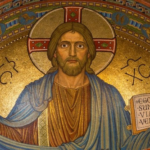We run our website the way we wished the whole internet worked: we provide high quality original content with no ads. We are funded solely by your direct support. Please consider supporting this project.
Predestination Part 2: Seeing Destiny Rightly
For Part 1, click here.
In Ephesians Paul teaches that God “chose us in [Christ] before the creation of the world to be holy and blameless in his sight” (Eph 1:4). In Christ, Paul continues, God “predestined us for adoption to sonship…to the praise of his glorious grace, which he has freely given us in the One he loves” – which, of course, is Christ (vs. 5-6). God made known to us “the mystery of his will” which he purposed in Christ (and that was hidden from the demonic realm throughout the ages, as discussed in chapter 3:8-9).
This plan was put into effect at the right time, and its goal was to “bring unity to all things in heaven and on earth under Christ” (vs. 10]. Paul then says again that we who are in Christ were “predestined according to the plan of him who works out everything in conformity with the purpose of his will” (vs. 11). And all of this, Paul says, was “to the praise of his glorious grace” (vs. 6, cf. vs.12).
Jesus represents the realization of God’s glorious dream for humanity. In Christ we see what we who are in Christ are destined to be. As a stick placed in a river is destined to be carried to whatever body of water the river runs to, so all who have allowed themselves to be drawn by the Spirit into Christ are destined to eventually look like Jesus (Rom. 8:28). When he appears at the end of the age, we shall see him as he truly is, John says, for we shall be like him (I Jn. 3:2).
This is why the New Testament speaks of Christ as “the firstbornamong many brothers and sisters.” A new family is being brought into being, and we shall all resemble Christ. This is also what Paul means when he refers to Jesus as “the first fruit” of those who now “sleep” (I Cor. 15:20). The “first fruit” in ancient Israel referred to fruit that was picked before the rest of the crop. These early pickings were, among other things, considered the guarantee that God would be faithful in bringing forth the rest of the crop. Jesus is “the first fruit” of a coming harvest that will look the same as him. Jesus reveals ahead of time the harvest of the humanity that God has always been dreaming of.
These insights add a new dimension to our understanding of what it means to say that Jesus was the Kingdom of God and why all who belong to the Kingdom, by definition, look like him. The entire creation project is centered on God’s dream of uniting himself with humanity as humanity co-rules with him on the earth. The whole creation is being steered toward a vision of a future in which everything will be harmoniously united under Christ, and thus become the dome in which God is King.
While individuals are free to align themselves with this divine vision or not, this glorious vision of humanity and creation becoming a radiant domain of God’s reign, dancing with and in the triune God, has been predestined from before the foundation of the world. It cannot fail to happen. And what we are now discovering is that Jesus incarnates this future in the present. He is the predestined man who embodies the predestined future (1 Pet 1:20).
Jesus manifests the future reign of God in the midst of the present reign of the Powers. He manifests the future union of God with humanity in the midst of a rebellious epoch in which God and humanity continue to be estranged from one another. He manifests humanity restored to their rightful place over the earth in the midst of a humanity that continues to be oppressed. He manifests humanity freed from sin and sickness in the midst of a humanity yet in bondage to sin and yet flogged by the devil with sickness.
So too, in the midst of a world that continues to be defined by oppressive Powers that incline us toward violence and hatred, Jesus reveals what humanity will look like when we’re exhaustively defined by God’s love. In the midst of a world where death continues to reign, Jesus’ resurrection reveals what humanity will be like when death has finally been overcome. In the midst of a world that continues to be oppressed by the ugly kingdom of Satan, Jesus reveals the beautiful Kingdom of God.
Category: General
Tags: Calvinism, Destiny, Free Will, Jesus, Open Theism, Predestination
Topics: Providence, Predestination and Free Will
Related Reading

Jesus is the Center of the Story
The previous post addressed how the revelation of Christ is the surprising twist that reframes how we must read all that precedes it. Today we’ll look briefly at five supports to this claim. Jesus said, “I have a testimony greater than that of John” (John 5:36). Jesus elsewhere claims that “among those born of women…

If God anticipates each possibility perfectly, how does he differ from the “frozen God” of classical theism?
Question: If God anticipates each and every possibility as if each were only possibility, how does God ever experience novelty and adventure? It seems that a God who perfectly anticipated (from all eternity) every single possibility as if it were the only possibility would not differ from the timeless “frozen God” of classical theism Answer:…

Podcast: Is God Outside of Time?
Greg discusses the nature of time, the importance of sequence, and the centrality of poetry. http://traffic.libsyn.com/askgregboyd/Episode_0286.mp3

Friday Lights: Sibling Rivalry
Each Friday we post content sent to us by our readers that is inspiring, funny, lighthearted or just generally fun. If you’d like more information on submitting content for this feature you can get more information here. Today’s post comes to us from Mike Taylor. Thanks Mike!

A Coming Storm
There is a storm beginning to brew on the horizon. It is a debate among Evangelicals about the violent depictions of God, stirred up largely by Eric Seibert’s Disturbing Divine Behavior. Here is a post that sounds “the clarion call.” The debate is presently around two options. Option #1: Traditionalists argue we must simply embrace…

Violence: What Did Jesus Do?
Thomas Quine via Compfight Here’s a spot-on reflection on what Jesus taught us about responding to violence. Whatever you think about the justification of violence in particular situations, as Christians we simply cannot escape the fact that Jesus demonstrated another way. From the reflection: And though he had access to unlimited power to have himself released…

